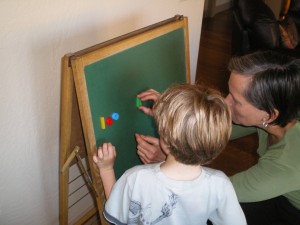ROOTS2READING: Helping Young Readers Succeed
 Roots 2 Reading is a new early literacy instructional service offered by Alison Date, a former elementary teacher and reading specialist. She provides instruction and support for young children, grades K-2, who are struggling readers or need reinforcement of strategies to become confident readers and writers.
Roots 2 Reading is a new early literacy instructional service offered by Alison Date, a former elementary teacher and reading specialist. She provides instruction and support for young children, grades K-2, who are struggling readers or need reinforcement of strategies to become confident readers and writers.
LG: Please tell us about your background and experiences.
AD: I am a certified literacy instructor with more than 20 years of Kindergarten and 1st grade classroom experience. I specialize in literacy instruction for young learners (K-2nd grade) who are having difficulty learning to read. I provide early literacy intervention so that children can experience success in reading.
LG: What is the goal or purpose of your business?
AD: The first year that I taught 1st grade, fresh out of college, I had NO idea how children learned to read and yet for some children that did not seem to matter. Most of my students learned to read despite my less than perfect efforts. Each school year, I had 3-4 students in a class of 20, who struggled to learn to read and were often unsuccessful at taking on the behaviors that good readers use. It was these struggling readers that motivated me to look deeper into what I could do to help them become successful readers and writers. Today, I know a lot about teaching reading and supporting early learners in taking on those strategies that all readers need to use. My goal is to help children overcome reading difficulties, so that they can experience the joy of reading.
LG: Why is reading important?
AD: Reading is important for knowledge: Well developed literacy skills are crucial to success in today’s society. Many children today are failing to achieve basic levels of reading. Early literacy skills are closely linked with later school achievement. Failure to read at grade level by 3rd grade can lead to continued difficulty in school and learning is no longer enjoyable.
Reading is important for enjoyment: A familiar book is like a good friend. One of my favorite summer past-times was walking to the library and coming home with books to read that week. I still love reading all kinds of books. Ashland has lots of literary events happening but this is not a mainstream phenomenon in our society. High interest reading is being replaced by test prep and standards acquisition in our public schools. I recently read that only 16% o adults are avid readers and 54% are non-literate. Reading, even in high socio-economic families is becoming a thing of the past. Reading for knowledge is important but reading for enjoyment helps individuals develop awareness, understanding and empathy. It can make you more human and a better citizen. Reading allows you to enrich your life and those around you without going anywhere.
LG: Why is early literacy intervention important?
AD: Most reading problems are preventable if children receive additional support in the form of effective literacy instruction. Unlocking the world of print is an individual experience and effort. All readers need to do the same thing but some don’t and that is what needs to be sorted out. Struggling readers have a difficulty rather than a deficit, which implies that it can be altered with good teaching.
LG: How do children learn to read?
AD: The process of reading and writing are the same for all learners. It is more complex than just learning set of skills or memorizing a list of words, although that is part of it. A literary processing system is an integrated set of strategic actions by which readers extract and construct meaning from written language. Good readers construct their own system of strategies. A reader needs to put the system to work using strategies to make meaning of print and to solve difficulties. They must actively work to comprehend the message in a text. They need to develop a foundation of item knowledge to support them in the decoding process. This literacy processing system becomes stronger the more it is used. It is a self extending system that improves with use. The more experience you have reading successfully the better you become at reading.
LG: How do you teach reading?
AD: It is important to have a safe, encouraging learning environment. I begin by finding out what a child knows, what they like and what they are good at. I want a student to feel successful and valued for who they are. Through observation and conversation during a lesson, I discover what is challenging or interfering with a student’s learning. I teach for independence, using specific, helpful support and providing authentic practice in reading and writing to strengthen a student’s processing ability. A 45 minute lesson consists of a routine that includes: reading familiar books, doing letter or word work, writing a story and reading a new book.
LG: Why do you teach reading?
AD: I believe that every child is capable of learning given the right opportunities, context and assistance. All children can learn but not at the same pace. Some children need a little more time and support to figure out how print works and that is what I seek to provide. When children finally get it figured out and start to take on the process of reading it is an exciting and empowering experience and I love helping to make that happen. The desire to provide this experience to ALL children is why I teach. I like working with young children because if they can have success in reading early on they will have the foundation for success in school and hopefully in life as well.
LG: What is one thing all parents can do to help their young children learn to read?
AD: Take time to read to and with your child every day. We need habits and routines in our lives and this is one that all parents should establish as soon as their child is born. It should be a fun and enjoyable time that you share together. If you were not read to or do not enjoy reading, you can break that cycle by learning the joy of reading with your child as they grow. The public library will guide you with reading events, advice and book selections that will allow that a positive reading experience to evolve.
Written By: Alison Date, Early Literacy Instructor
541-482-1231




